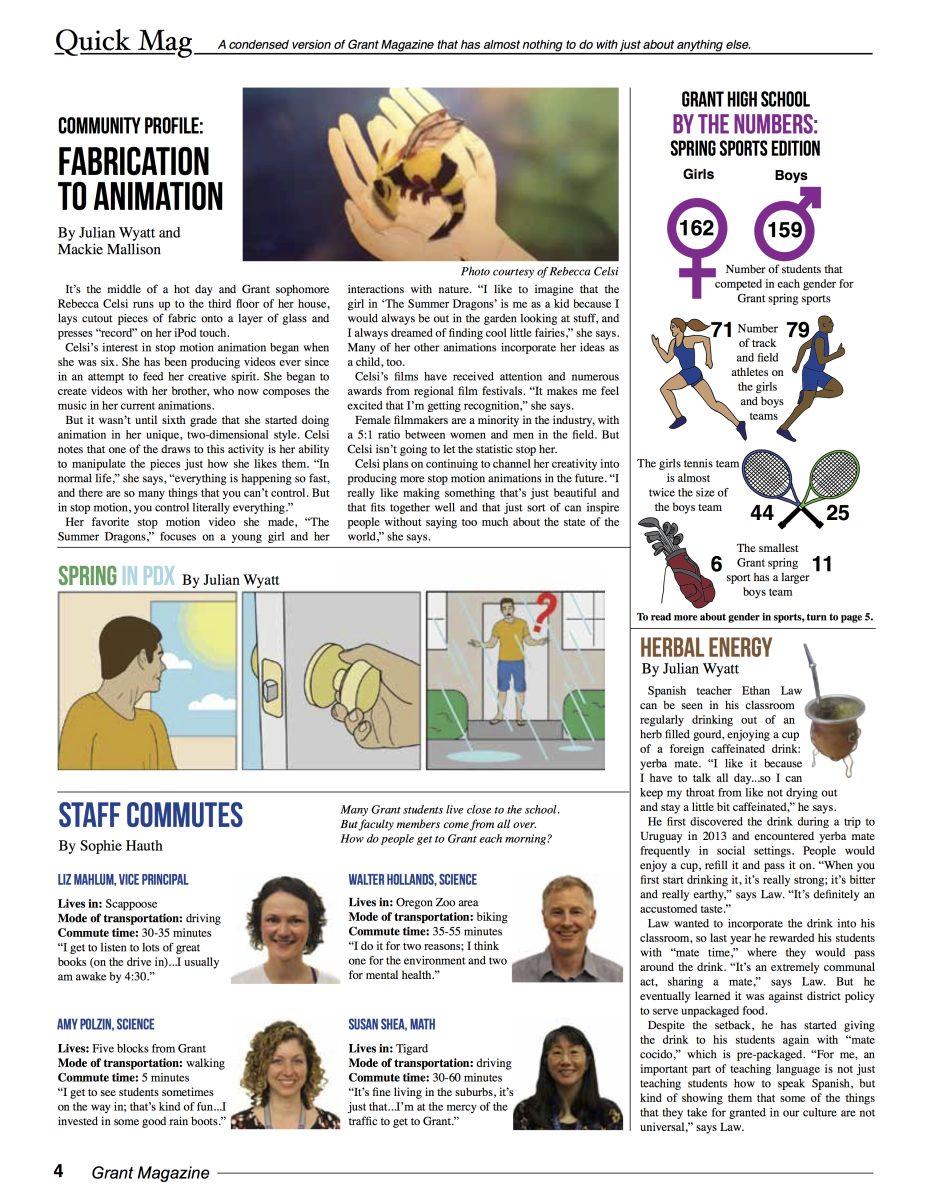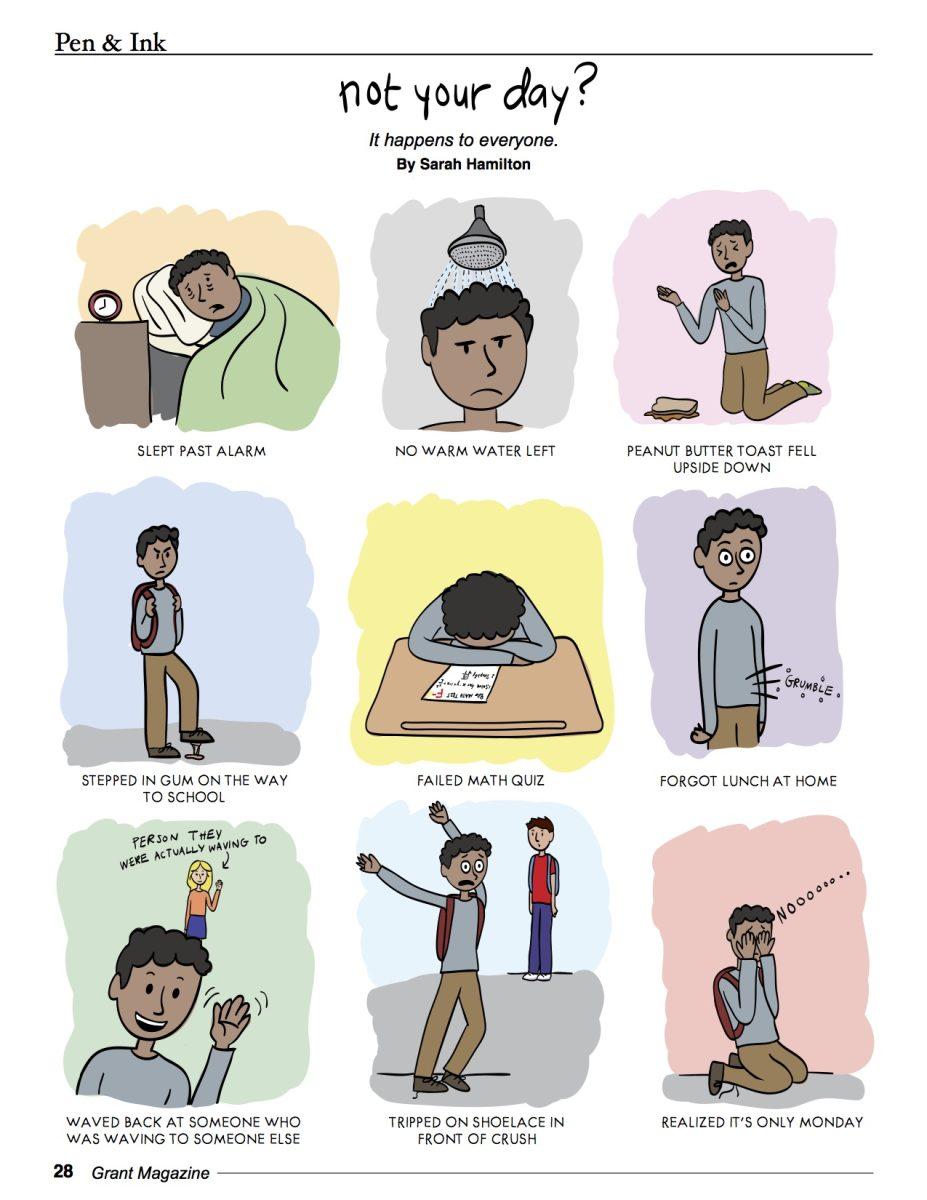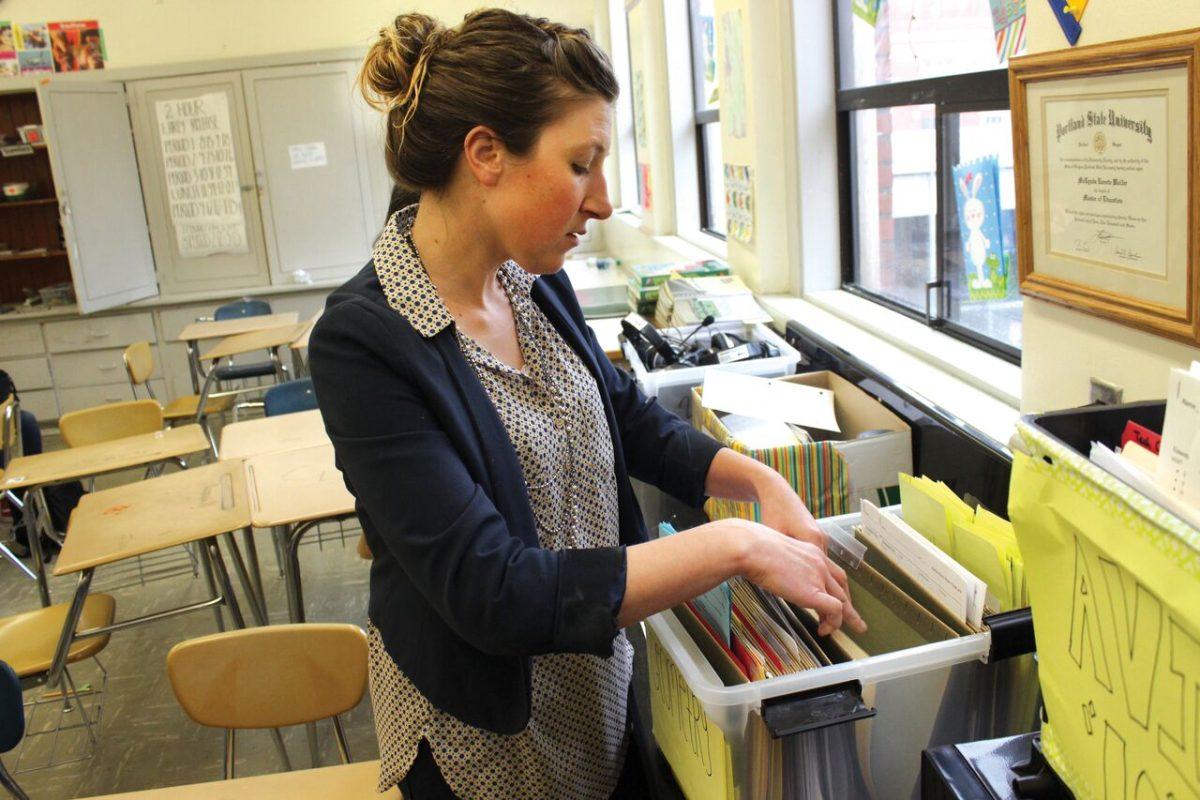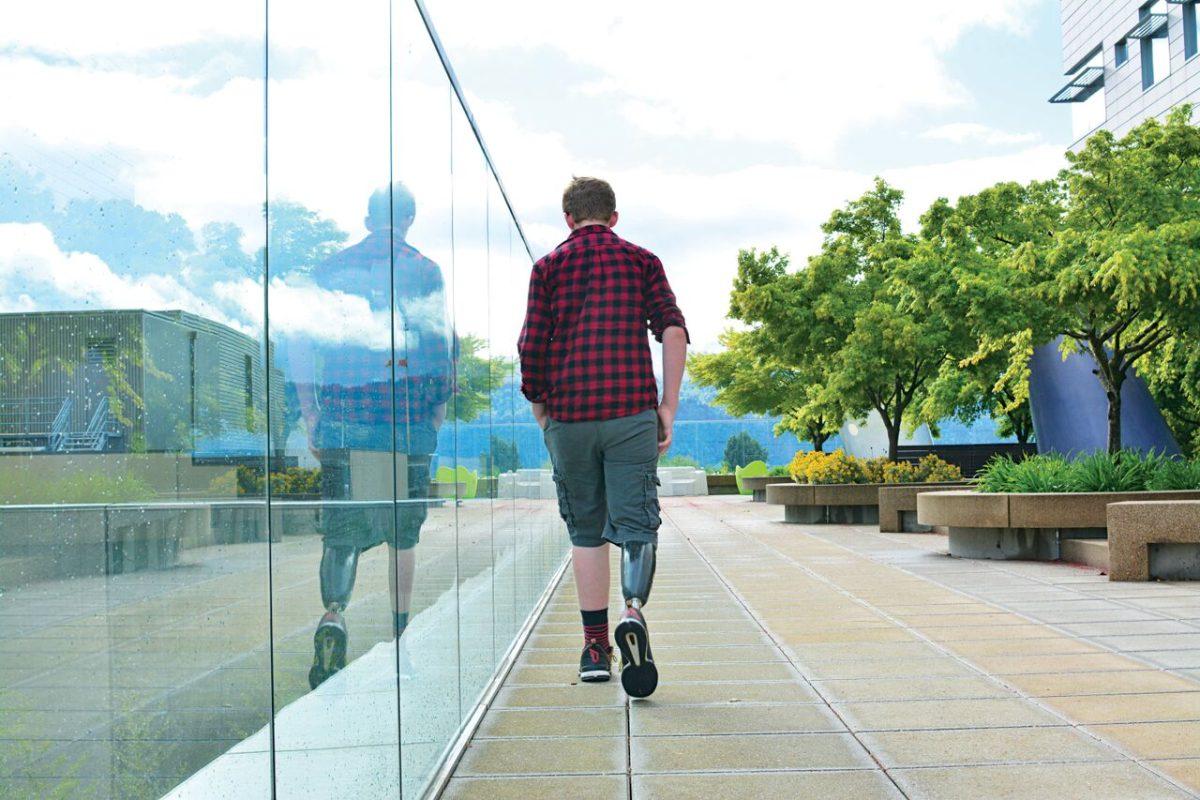
Tom Fischer remembers sitting in the brightly lit hospital room in September 2012, waiting patiently for the results of his X-ray. His right ankle was swollen and aching, but he tried to ignore it as his father continued to wonder out loud why it was taking so long.
When the pediatrician came back in, he had a grim look on his face. It wasn’t the kind of look that came with announcing a sprain or some other minor injury.
Instinctively, Fischer knew something was wrong. The doctor pulled his father aside and began speaking in a hushed voice. Fischer – then 11 – didn’t understand what was going on. He didn’t know the conversation he was about to have would change his life.
Osteosarcoma, the doctor told them. Bone cancer. Two years later, in the spring of Fischer’s seventh-grade year, surgeons amputated the leg from the knee down. Since then, he’s had to adjust his lifestyle to accommodate the absence of it.
For years, Fischer struggled to find peace with his circumstance. But now a freshman at Grant, he says the experience changed the way he approaches new situations. “It just kind of gave me like a better perspective on life as a whole,” Fischer says. “And I guess that kinda made me better prepared in the coming years of my life.”
• • •
Tom Fischer was born on June 7, 2001, in Northeast Portland. His parents describe him as outgoing and kind; he was taught at an early age that the right thing to do was be nice to everyone. “My mom always drilled that into my head,” he says.
From the start, his life revolved around sports. He collected sports cards of players on his favorite professional teams, spent his weekends playing in games with his own and passed his time after school shooting hoops on days he didn’t have practice. Though he jumped around from sport to sport, Fischer always came back to basketball. He was an avid Portland Trail Blazers fan and went to many games as a kid.
In the summer of 2012, Fischer had just finished fifth grade and was preparing to make the jump from elementary to middle school. Life was easy. That August, he twisted his ankle badly while on a hike at a summer camp. Fischer remembers not thinking the event was especially memorable. “It was a sorry excuse for a hike,” he says. “It was like a death march on a gravel road.”
When Fischer came home, his ankle was bruised and swollen, but nothing seemed too out of the ordinary. “With sports injuries and what not, we’d seen that kind of thing before,” recalls Jon Fischer, Tom’s father. “We didn’t think anything of it.”
He iced it and rested. But it was still bothering him weeks later. His mother, Amy Robinson, suggested a doctor’s appointment, and Jon Fischer took his son to see a pediatrician.
At first, the pediatrician didn’t see anything wrong. But the X-ray showed something wasn’t right. “When the picture came back, it went high enough up to about midway on his shin that it showed on his tibia that the bone was kind of abnormal,” Jon Fischer remembers. “By the naked eye and the untrained eye, it didn’t look unusual to me.”
But it was unusual. Osteosarcoma is a disease most commonly found in children and teenagers because it occurs in growing bones, the doctor said.
The next two years of his life seemed to blend together. Fischer’s parents remember the time to be marked by a series of life-altering decisions. Every day brought something new.
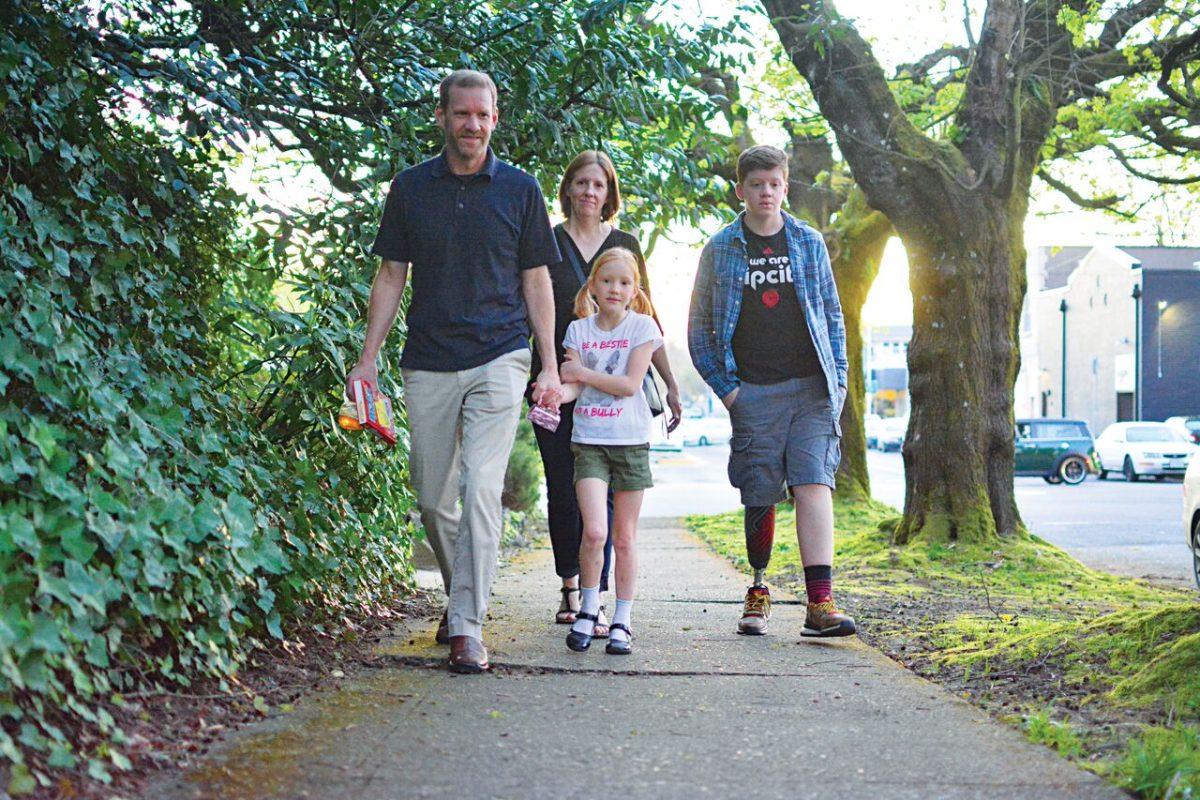
“We had various options on surgery right away,” says Jon Fischer, “including amputation…or trying to salvage his leg through a kind of a complicated procedure. And if we did that, where would you do it? Which doctors?”
The following months were a blur of long stays at different hospitals, with different doctors and only short breaks at home. Though they’d been pitched a slew of options for how to get rid of the cancer, the family ultimately decided on chemotherapy, which would take place at Randall Children’s Hospital in North Portland.
While on chemo, doctors advised Fischer to stay inside. But his parents bent the rules, sneaking him out to an early movie every once in awhile. They wanted to make sure their son still had fun despite the overwhelming circumstances.
“I understood what was going on, but I wasn’t, you know, spending all my time thinking about how I was going to die, I was trying to have fun and be a kid”- Tom Fischer
The days spent in the hospital quickly got boring, and the family looked for new ways to pass the time. They soon had a pre-packed case for Fischer’s video game system that they brought with them every time they visited the hospital.
“Those long stays…were really like camping in a lot of ways,” Amy Robinson recalls. “We took pillows and blankets and clothes, food of all sorts because inevitably you get tired of the food in there.”
The chemotherapy affected Fischer’s taste buds, and he often felt nauseous. He remembers foods he normally loved having no flavor and tasting terrible. Over the course of his sixth-grade year, Fischer dropped 23 pounds from his normal weight of 120.
“It’s very difficult to see your child lose a lot of weight and lose their hair, even though you know it is the result of a life-saving medicine,” says Robinson.
Jon Fischer remembers keeping track of Tom’s weight on his phone. The chemotherapy weakened their son’s immune system, and his parents became his nurses away from the hospital. They monitored everything, from whether he might be developing fevers to making sure he took his medication, which would sometimes get up to 15 pills three times a day. “This is like my breakfast,” he often joked.
The family installed a hand sanitizer by their front door, and anyone who came to visit had to make sure they had clean hands.
Fischer says there were upsides to chemotherapy. “Maybe I was like too young still to really understand the severity but…I didn’t like spend a lot of time pondering,” he says. “It was just a lot of movies, a lot of video games.”
In the hospital, there was a classroom where Fischer frequently borrowed books. He made stronger relationships with the on-call staff and got to eat heaps of junk food to keep his electrolyte levels up.
But the food didn’t taste good unless it was salty or spicy, and most days he felt too sick to play or even move. Soon, the family had to make the decision of whether they were going to amputate Fischer’s leg or undergo a different surgery to save it. They decided to try a procedure in Seattle that would allow Fischer to keep his leg.
He had visited Seattle a few times in his early childhood to watch baseball games with his grandparents. He looked back fondly on those memories but soon began to dread every trip, his image of the city forever tainted by doctors and his sickness.
Just after sixth grade, Fischer completed chemotherapy. Though he still had to make frequent visits to the hospital for scans, he was hopeful. He was steadily getting healthier and working on using his leg again. He went back to school at Mt. Tabor Middle School, and his teachers helped to catch him up with all his schoolwork.
But during a check-up appointment halfway through the school year, he found out the tumor in his right leg had come back.
“That was painful because we thought we were home free,” says Jon Fischer. “At that point, he’d had the surgery. The tumor was out. He was done with chemo. He was getting healthier; we were into seventh grade. We were all about functioning of the leg and just tracking what was going on with making sure none of the cancer was coming back.”
“That was painful because we thought we were home free”- Jon Fischer
His mother says it was like having a flashback. “It was disturbing in the same way that it was the first time,” she recalls. “Partly because you don’t know entirely what that means. A lot of what’s so difficult for folks facing cancer is the uncertainty about what the future’s going to be like.”
The process would have to start all over again. This time, amputation became a threatening reality.
“One of the frustrating things about this process is people give you choices, but because these decisions are so important, no one wants to tell you what to do,” Fischer’s mom says now. “Everyone is very reluctant to give you advice. And advice is what you really, really need.”
The family pushed everyone for answers, asking things like, “What would you do if it was your kid?” But in the end, it was their decision to make. They reluctantly deemed amputation the best choice.
Even then, Fischer tried to rise above his circumstance. “I understood what was going on, but I wasn’t, you know, spending all my time thinking about how I was going to die,” he says. “I was trying to have fun and be a kid.”
After weeks of preparation, the family arrived at Seattle Children’s Hospital ready to take the next step. But when they got there, the emergency room was backed up. The doctors told Fischer his surgery had been delayed two weeks.
So the family returned to Portland and waited. “I had gotten all emotionally prepared for it, and then they just cancelled it,” Fischer says now. “I was young, so I didn’t really know what I was going through.”
The next time they prepared to go to Seattle, everything went as planned. Fischer spent the day relaxing, not eating and waiting. When the family got to the hospital, they remember trying to stay calm. Fischer says he wasn’t worried or scared because his parents were focused on making him comfortable. Everyone felt emotionally prepared.
Just after Fischer went under anesthesia, Amy Robinson says she kissed her son’s foot goodbye. Then Fischer was taken into the operating room, and his parents waited.
“I was young, so I didn’t really know what I was going through.”- Tom Fischer
After the amputation, Fischer was given a list of things he had to complete before he would be allowed to leave the hospital. The list included simple tasks like taking a shower, using the crutchesw and going out on the hospital’s patio. He did everything in four days – two days faster than what doctors say is normal.
“We were trying to get out of the hospital as quickly as possible,” he recalls.
That’s when the real work began. He experienced phantom pain, a common symptom in amputees where pain emanates from a part of the body that is no longer there. He remembers taking up to 36 pills a day for the pain.
Back in Portland, adjusting to a prosthetic leg was a slow and difficult process. Sometimes, he would slip on his crutches and lose his balance or forget that his leg was gone and fall out of bed in the morning. Still, Fischer didn’t lose stamina. He understood that he was never going to have his leg and was determined to adapt quickly.
“It’s kind of a big sentence to say,” Fischer says. “Like, ‘Oh I had cancer, and then my leg was amputated.’”
He soon found a silver lining. In 2013, Fischer’s social worker told him about an Oregon-based nonprofit camp for cancer patients and amputee kids called Camp UKANDU. Fischer enrolled and went away alone for the first time since his surgery.
Macen Kroll, 15, was diagnosed with acute lymphoblastic leukemia at age two and met Fischer during his second year at the camp. “We were going to be close,” she says of Fischer, who was wearing a sparkly pink cowboy hat the first time they met. “I knew it right from the start.”
Both Kroll and Fischer say their experiences at the camp have been transformative. “It was a great way just to get away from everything,” says Kroll. “No matter what you looked like or if you couldn’t walk, you were accepted, and everyone saw you for who you were and not just what you looked like.”
“You see people who have beat cancer, and it gives you a whole new sense of courage,” adds Fischer.
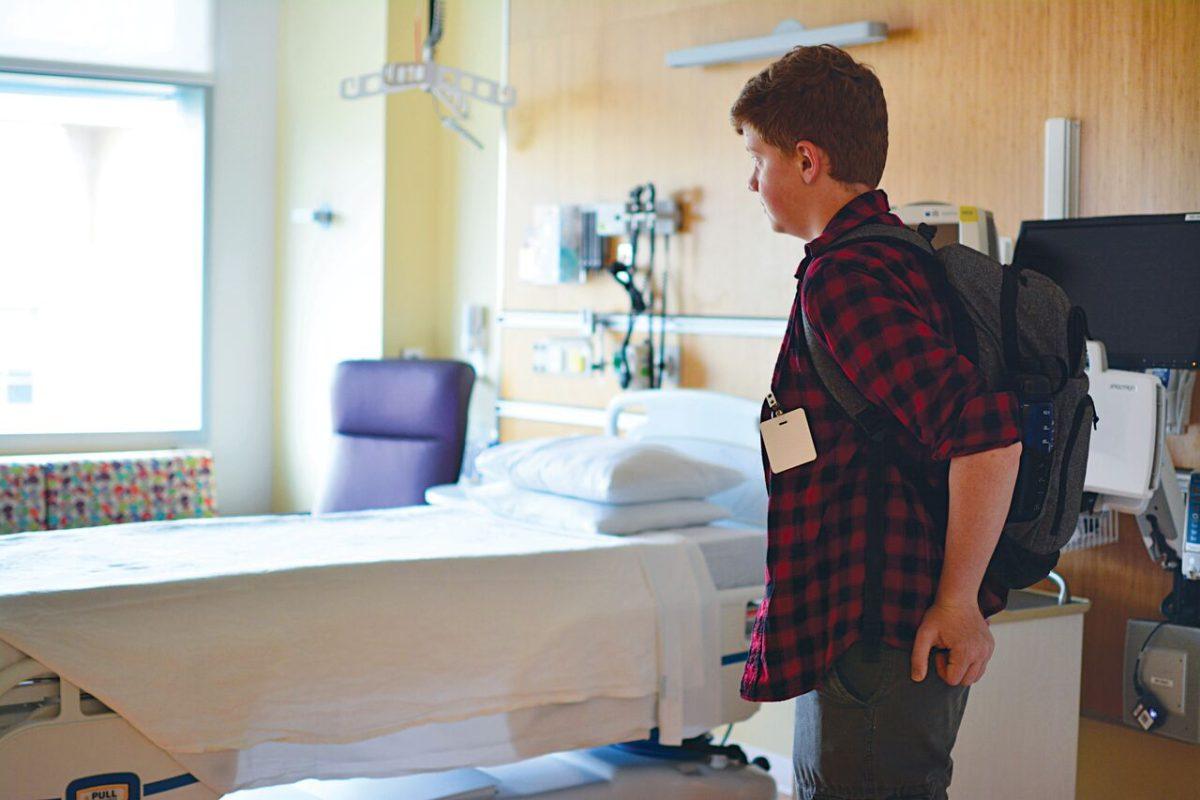
In October 2014, Fischer had a major setback. He’d convinced his parents to let him go trick-or-treating on Halloween with his best friend, Reef Hutasangkus, and the two boys were walking down a driveway when Fischer slipped on wet pavement.
His leg twisted underneath him, and his prosthetic leg bent upwards, pushing against his upper thigh. Fischer heard a loud pop that sounded like someone’s knuckles cracking. He’d broken his right femur.
Jon Fischer describes the break to be an “insult injury.” Fischer was forced back into the wheelchair he’d used earlier. But this time, he chose to embrace the situation. “It was like, ‘This is gonna be who I am for the rest of my life,’” he remembers thinking. “So I kind of had to just come to (terms) with it.”
• • •
Tom Fischer walks slowly down a quiet hallway on the fourth floor of Randall Children’s Hospital in North Portland. He rounds the corner, and nurse Joshua Seethoff calls out to him from behind a desk. Fischer’s face instantly brightens.
They exchange greetings but are soon cracking jokes and making each other laugh, sliding easily into what seems like an old routine.
During his time at Randall, Fischer developed tight relationships with many of the hospital’s staff. Seethoff took care of him during chemotherapy treatment, and they quickly bonded over Camp UKANDU, where Seethoff works during the summer.
Seethoff says Fischer sticks out from the many patients he tends to each day. “He didn’t seem to have the whole ‘poor me’ attitude,” says Seethoff. “He deserves to feel sorry for himself, and I didn’t see it much in him.”
This tendency, Seethoff says, is inspiring.
“It’s really what I guess a lot of people that work here would say keeps us going,” he says. “We’re around the sickness and the pain and the sadness all the time, but…when Tom comes in…we just get so excited because we see him looking a lot healthier, and he’s got his hair back and he’s smiling and he’s not sick.”
Now, almost four years since first starting chemo, Seethoff has become a role model for Fischer, who says he also wants to become a counselor at a camp for cancer patients. “Anything I can do, I’d definitely be happy to,” he says.
Family members look back on the last four years and say they marvel at Fischer’s ability to beat the odds.
“He was a good, positive dude before the cancer, and he’s still that now,” says Fred Robinson, Fischer’s uncle. “That impressed me because I could imagine someone’s spirit getting a little darker over that, and it doesn’t appear to have done so for Tom.”
Fischer is grateful for the perspective he’s gained through fighting cancer. “I don’t know if it’s really a good or bad thing that’s happened; I can’t really tell,” he says. “I feel lucky, but I feel like, at the same time, in a way that takes away from the people that weren’t so lucky. I did it. That’s pretty much what it is.” ◊

































